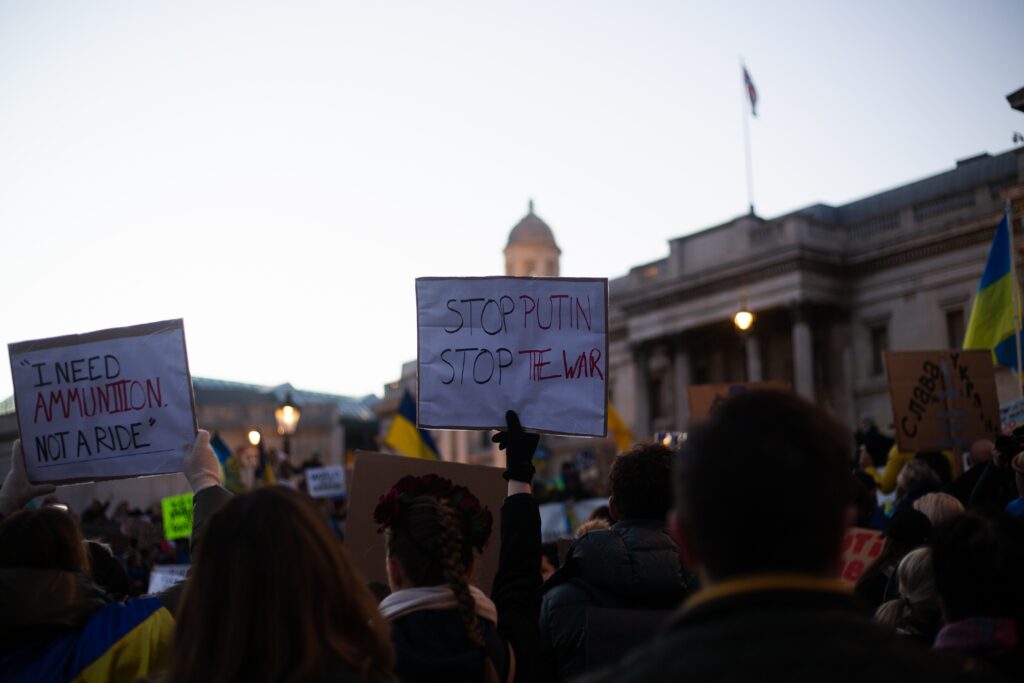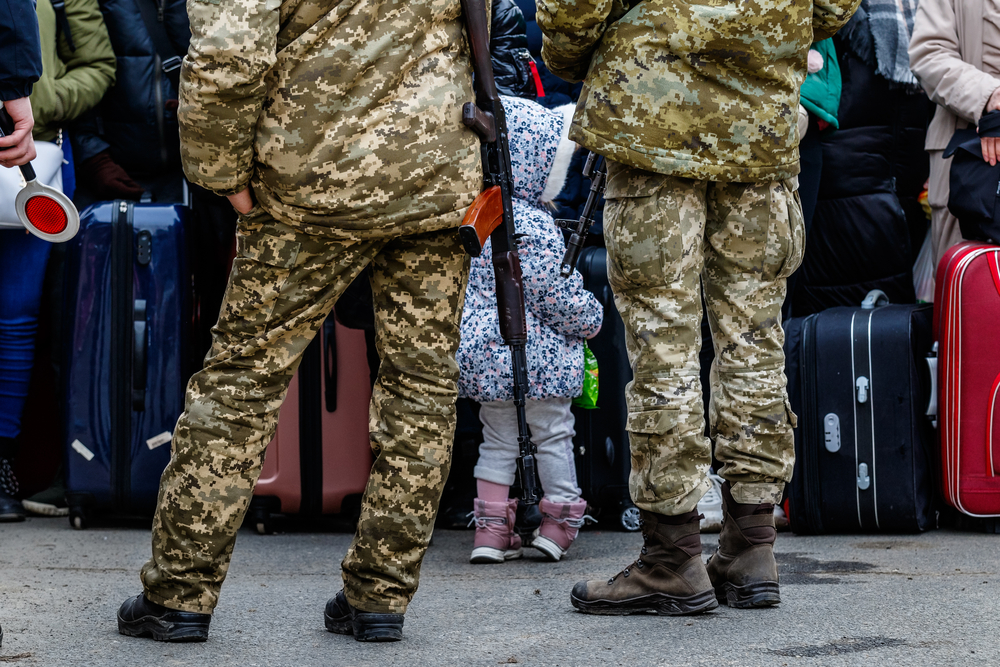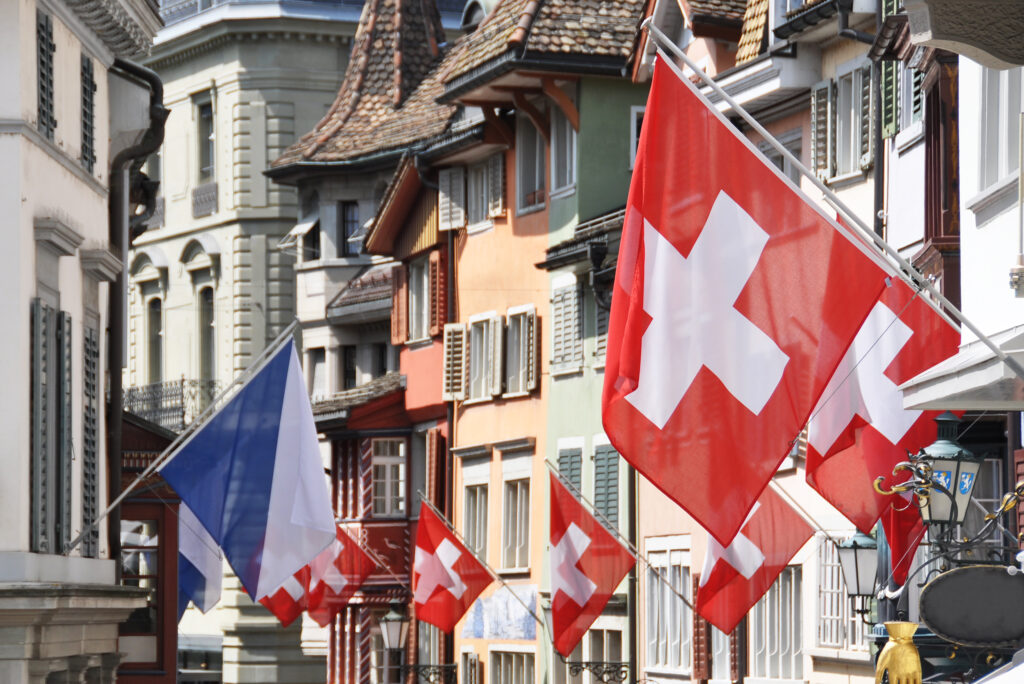Mié, May 4th 2022
After Switzerland banned an export of ammunition to help Ukraine’s war efforts, politicians are calling for the famously neutral country to redefine how far neutrality extends. And some are even saying that the Swiss people should make the decision via a public vote.

Protestors across Europe have been calling for an end to Russia’s war against Ukraine.
Politicians from the left to the right are calling for Switzerland to re-define what the country’s particular brand of neutrality means, as Russia’s invasion of Ukraine continues to unearth new and prickly circumstances for the historically impartial country.
A move away from neutrality
Days after the initial invasion, Swiss Confederation President Ignazio Cassis announced that Switzerland would enact the full sanctions proposed by the European Union in what many viewed as a step away from neutrality. Cassis defended the move by stating that Switzerland cannot remain unbiased when it comes to violating international law, as Russia has. The Swiss government announced in March that no Russian money is coming in and out of Switzerland and that at least ten Swiss properties belonging to Russian oligarchs have been frozen.
But a more recent report found that only about $8 billion of Russian assets have actually been frozen, despite the Swiss Banker’s Association estimating that there is about $150-200 billion of Russian funds in Switzerland. Bank officials say most of that money is being held under different aliases or under lawyers working for oligarchs, and some smaller, private institutions are not trying to lose Russian customers.
Want to learn more? Read about Switzerland’s complicated history of neutrality
A few members of Switzerland’s left-wing Green National Party, including Council President Irène Kälin, traveled to Kyiv last week and met with Ukrainian President Volodymyr Zelensky. Although the guise of the visit was to discuss financial and humanitarian aid, the move was an unprecedented one for any Swiss politician. The right-wing Swiss People’s Party condemned the visit, calling for Switzerland to further strengthen its claim to be neutral in times of war.

Switzerland has opened its doors to tens of thousands of Ukrainian refugees under a special “S” permit program launched in March.
A move back to neutrality
At the same time, Germany’s Chancellor Olaf Scholz announced that Germany could not deliver the badly needed Marder grenadier tanks to Ukraine as expected because Switzerland recently backed out of filling an order to produce ammunition which goes in the tanks.
Exportar munición incluso a un intermediario y luego a "países implicados en conflictos internos o internacionales intensos y duraderos" viola la Ley de Material de Guerra del país, afirma el ministro de Economía suizo.
"He señalado en todas mis declaraciones en Ucrania que Suiza no puede suministrar ni suministrará armas", declaró Kälin a los medios suizos justo después de su visita a Kiev, añadiendo más recientemente que está "bastante abierta" a un debate sobre la modificación de esa ley.
Time for change?
“I cannot understand why we are not supplying weapons to an aspiring democracy in Europe that has to defend itself on its territory, while we are doing this to countries that don’t share our values in any way over and over again,” parliamentarian Beat Flach from the Green party told the NZZamSonntag newspaper.
“I want to allow arms exports if a democracy has to defend itself on its own territory,” Flach said. He, along with other members of his party, are asking the Federal Council to change the War Materials Act and consider a “radical reinterpretation of neutrality.” So far, reactions have been mixed.
Relaxing the War Materials Act is one thing, but changing neutrality opens the door to participating in war, say politicians from the Swiss People’s Party. Meanwhile, politicians from centrist parties say the Swiss parliament should at least open the floor for discussion.

Swiss protestors gather outside of the United Nations headquarters in Geneva, Switzerland.
Looking at history
“Neutrality in Switzerland has always been stretchable and kneadable like chewing gum,” says historian Hans-Ulrich Jost, a former Swiss army officer and professor of Swiss history at the University of Lausanne. That said, he argued that delivering weapons would violate Switzerland’s neutrality as it stands.
Former history professor at the University of Basel, Georg Kreis, disagrees.
“It is not the understanding of neutrality that determines what is possible, but the law on the export of war material,” Kreis said in an interview with NZZamSonntag.
Kreis reasons that the War Materials Act could be changed to make a distinction between war material used for offensive purposes and material used for defensive purposes. In this case, the ammunition in question was intended to anti-aircraft tanks shot by Ukrainian soldiers on the ground in their own country fending off Russian planes. Moreover, the War Materials Act could allow for deliveries to be made to another country, such as Germany, and still ban direct deliveries to warring country.
“This does not mean giving up neutrality, but greater flexibility in dealing with it,” Kreis says. This approach is more in line with how Switzerland cooperated with the U.S. during the Cold War and not how Switzerland functioned during World War II, he says.

Traditional Switzerland is not often a country associated with change, but the citizens may think otherwise when it comes to their famous neutrality, politicians say.
Mirando al futuro
Ultimately, the people of Switzerland should decide how Swiss neutrality is defined during war and in the future, according to Free Democratic Party National Councilor Hans-Peter Portmann. As with almost every decision in Switzerland, it should be decided through a public vote by Swiss citizens, he says.
